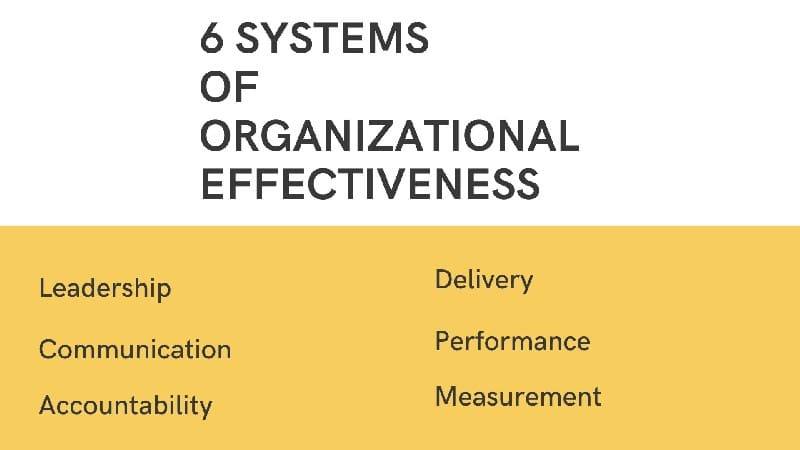Middle Management: A Critical Link In Organizational Effectiveness

Table of Contents
The Role of Middle Management in Bridging the Gap Between Leadership and Employees
Middle managers are the linchpin of organizational effectiveness, responsible for translating high-level strategies into actionable plans for their teams. They are the crucial communication link, ensuring that strategic directives from senior leadership are clearly understood and effectively implemented at the ground level. This two-way communication is vital; it allows middle managers to gather feedback from their teams, identifying potential roadblocks and suggesting improvements to the overall strategy. This feedback loop is essential for maintaining strategic alignment and achieving organizational goals.
- Translating strategic goals into operational plans: Middle managers dissect overarching strategies, breaking them down into smaller, manageable tasks and goals for individual team members.
- Facilitating effective communication between senior leadership and frontline employees: They serve as conduits for information, ensuring transparency and clear communication in both directions.
- Gathering and providing feedback from the teams to upper management: This vital feedback loop helps senior leaders understand the practical realities of implementing strategies and make necessary adjustments.
- Ensuring consistent implementation of company policies and procedures: Middle managers are responsible for enforcing company-wide policies and procedures, ensuring consistency and compliance across teams.
- Identifying and addressing potential roadblocks to achieving strategic goals: Their proximity to the day-to-day operations allows them to quickly identify and address challenges that might hinder progress.
Essential Skills for Effective Middle Management
Effective middle management requires a blend of hard and soft skills. While technical expertise within their specific field is important, strong leadership and communication abilities are paramount. These individuals must be adept problem-solvers, capable of making sound decisions under pressure. Moreover, fostering a positive team dynamic requires excellent interpersonal skills and conflict resolution expertise.
- Strong leadership and team management abilities: Motivating, guiding, and developing team members are key responsibilities.
- Excellent communication and interpersonal skills: Clear, concise, and empathetic communication is vital for fostering collaboration and understanding.
- Proficient problem-solving and decision-making skills: Middle managers often face complex challenges and must make timely, effective decisions.
- Conflict resolution and negotiation expertise: Addressing conflicts fairly and efficiently is crucial for maintaining team cohesion and productivity.
- Ability to mentor and coach team members: Supporting the growth and development of their team members is essential for long-term success.
- Adaptability and flexibility in a changing environment: The ability to adjust strategies and approaches in response to changing circumstances is vital.
Middle Management's Impact on Employee Engagement and Performance
The effectiveness of middle management directly impacts employee engagement and performance. A supportive, communicative, and empowering middle manager fosters a positive work environment where employees feel valued, motivated, and productive. This translates to higher employee retention rates, reduced turnover costs, and increased overall productivity.
- Creating a positive and supportive work environment: A positive atmosphere boosts morale and encourages employees to contribute their best.
- Providing regular feedback and recognition to team members: Consistent feedback and recognition enhance motivation and performance.
- Implementing effective performance management strategies: Setting clear goals, providing regular performance reviews, and offering constructive feedback are crucial for employee growth.
- Fostering a culture of teamwork and collaboration: Encouraging teamwork and collaboration leads to better communication, improved problem-solving, and increased productivity.
- Addressing employee concerns and resolving conflicts promptly: Addressing concerns quickly shows employees that their well-being is valued.
- Contributing to higher employee retention rates: A positive and supportive work environment, combined with effective management, contributes to higher retention rates, reducing recruitment and training costs.
Developing and Supporting Middle Management
Investing in middle management through targeted training and development programs is crucial for organizational success. This investment pays significant dividends, improving their skills, enhancing their leadership capabilities, and preparing them for future leadership roles.
- Providing opportunities for professional development and training: Offering relevant training programs keeps skills sharp and expands capabilities.
- Implementing mentoring and coaching programs: Pairing experienced managers with emerging leaders provides valuable guidance and support.
- Establishing clear career progression paths: Providing clear career paths motivates middle managers and encourages loyalty.
- Investing in leadership development programs: Specialized leadership development programs hone essential skills like communication, delegation, and conflict resolution.
- Creating a culture of continuous learning and improvement: A culture that values ongoing learning ensures middle managers remain adaptable and effective.
Conclusion:
Effective middle management is not merely a layer of bureaucracy; it's the engine that drives organizational effectiveness. By investing in their development, fostering open communication, and providing the necessary support, organizations unlock the full potential of their workforce. The skills and responsibilities discussed—from bridging the gap between leadership and employees to fostering a positive work environment—directly impact employee engagement, performance, and overall organizational success. Invest in your middle management today to unlock the full potential of your organization. Effective middle management is a cornerstone of organizational effectiveness – don't underestimate its power.

Featured Posts
-
 Knicks News Jalen Brunson Injury Update Tyler Koleks Extended Role And Season Finish Outlook
May 16, 2025
Knicks News Jalen Brunson Injury Update Tyler Koleks Extended Role And Season Finish Outlook
May 16, 2025 -
 Match Report San Jose Earthquakes 4 1 Portland Timbers
May 16, 2025
Match Report San Jose Earthquakes 4 1 Portland Timbers
May 16, 2025 -
 Kinopoisk Otmechaet Rekord Ovechkina Soski S Ulybkoy Kapitana Dlya Mladentsev
May 16, 2025
Kinopoisk Otmechaet Rekord Ovechkina Soski S Ulybkoy Kapitana Dlya Mladentsev
May 16, 2025 -
 Michael Venom Page On Pimblett Vs Chandler A Victory Roadmap
May 16, 2025
Michael Venom Page On Pimblett Vs Chandler A Victory Roadmap
May 16, 2025 -
 Fanatics Official Merchandise For Boston Celtics Nba Finals Quest
May 16, 2025
Fanatics Official Merchandise For Boston Celtics Nba Finals Quest
May 16, 2025
